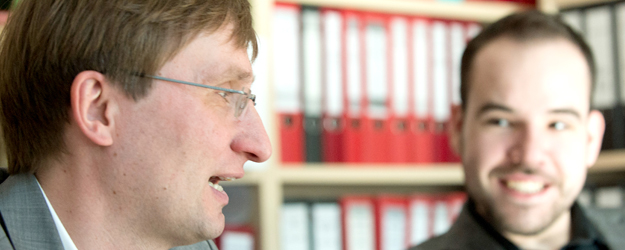18 March 2014
Falko Bell is the first student to be awarded his doctorate at Glasgow and Mainz simultaneously. The award is the current high point of a close cooperation between the Departments of History at Johannes Gutenberg University Mainz (JGU) and the University of Glasgow in Scotland. Professor Sönke Neitzel is the driver behind the project.
One lives in Berlin and currently teaches at the renowned London School of Economics, the other has just returned from Glasgow, where he defended his dissertation. Both have returned to the Department of History at Mainz University to talk about their special relationship which started here.
Professor Sönke Neitzel and Dr. Falko Bell are in conspicuous good mood. They meet in a conference room in the Philosophicum building and it really feels like a homecoming. The doctoral advisor is thrilled about his successful student and is full of praise. Bell seems almost embarrassed about it.
Research into intelligence services
"He had perfect scores in Math and History," says Neitzel with a smile. "It really says it all. His CPU is simply faster than mine. It's a physical thing," jokes Neitzel. "He has just got a greater computing capacity." Neitzel then gets a bit more serious: "As a lecturer it is very important to help such people, to tell them: Go for it, whenever you're ready."
Neitzel has been a big help: Bell is the first JGU student to receive a doctoral certificate from Glasgow and Mainz. He is the first "Double PhD" in the history of the cooperation between the University of Glasgow and Johannes Gutenberg University Mainz.
Bell's dissertation examined a field seldom investigated in Germany but well researched in the UK and USA: the intelligence services. In "To know is human. The Importance of Human Intelligence in the British War-Time Strategy 1939-1945" Bell examines how British intelligence services during World War II used prisoners of war, spies, and refugees to find out more about the situation in Nazi Germany. What were the premises for their work? What were the results? What was their impact?
Cooperation at four levels
"Since the early 1990s, Glasgow and Mainz have been ERASMUS partner universities," says Neitzel. "The History departments at both universities were particularly active in this cooperation." There has been and still is a lively exchange of teaching staff and students. Neitzel himself was on the academic staff at the JGU Department of History from 1994 and qualified as professor here. In 2001 he was a Visiting Lecturer in Glasgow, in 2011 he was appointed Professor of Modern History there.
Neitzel set himself to intensify the cooperation between the two universities. "It was great that I knew both universities. I knew which strings needed to be pulled." The goal was a partnership at four levels. The exchange of students and teaching staff was where everything started. Neitzel then pushed for a double PhD, offering doctoral candidates to do their research at both partner universities and submit the written paper at one university and take the oral examination at the other.
"Falko Bell is the best example that it can work," says Neitzel. The fourth level, a dual degree master’s degree Mainz–Glasgow, is being planned. Though it won't be easy. "There is much talk about internationalization. But implementing it at the administrative level is a lot of work," says Neitzel. "But Mainz is giving us great support!"
Two research cultures
Falko Bell came to Glasgow for the first time in his fifth semester. "I didn’t know much about differing research cultures at the time," he recalls. However the Mainz–Glasgow axis was just what his dissertation needed. "Scholarship on the intelligence services is barely touched upon in Germany," he says. "This is completely different in Anglo-American research."
Bell's dissertation examined the importance of British intelligence findings in the country's war-time strategy. During his research, he was surprised by the extent of the data compiled during the Second World War. "In a prison camp up to 1,000 people were responsible for the accommodation, interrogation, and evaluation of prisoners. Psychologists were also on staff."
The question about the collapse
Bell focused on three subjects: the Battle of Britain, Germany's use of V weapons, and how the British evaluated German morale. This last point opened up a fundamental problem. "It was dealing with assumptions," says Bell. "The British assumed that German morale would collapse. In 1943, they assumed the situation was the same as in 1918." The remit to the intelligence services thus was: "Tell us when the whole thing will collapse." And not: "Find out how German leadership and the populace are dealing with the war situation."
"It’s a bit like in the Iraq War," Neitzel adds. "Then the remit to the American intelligence services was not to find out whether Hussein had weapons of mass destruction. The question was: where are the weapons of mass destruction?" It is a recurring problem.
Bell is at a crossroads after his dissertation. The "Double PhD" has opened him to the exciting Anglo-American research world on intelligence services, but this is a topic very much at the fringe in Germany. What route should he follow? Where does he have the greatest opportunity to further his academic career?
He shrugs. "I would love to put historical scholarship of intelligence service on a solid methodological footing – or examine a new, interesting subject," he says. Whether or not he will do so in Mainz, Glasgow or somewhere else is something that needs to be put through his CPU. Whatever he chooses will not be easy but the choices he has are much greater thanks to the first Mainz–Glasgow double PhD.



